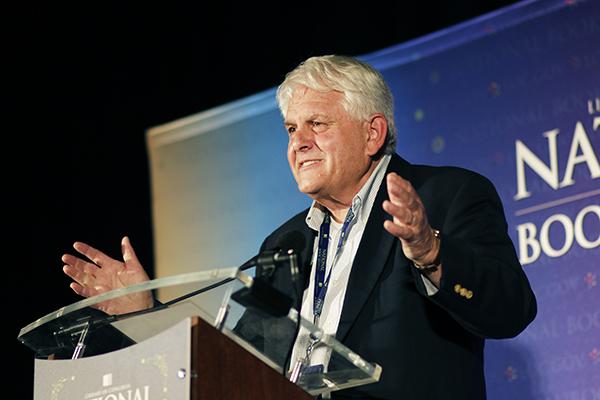
Classics and anthropology professor Eric Cline is used to teaching in lecture halls full of students. But this weekend, his audience numbered more than 1,000 at one of the most popular literary events in the country.
Both Cline and clinical professor of psychiatry Theodore David George spoke about their most recent books Saturday at the Library of Congress National Book Festival.
“After a few minutes it felt like I was back [teaching] at GW. But I don’t think I’ve lectured 1,500 people before,” Cline said.
He said as the author of 16 books, this opportunity has hovered on the horizon for him since he published his first book in 2004.
“I see it happen every year [on the National Mall], and I’ve always wanted to be part of it,” he said.
The festival moved indoors this year to the Walter E. Washington Convention Center after the National Park Service voiced concerns that booths and equipment had damaged the grass on the National Mall in the past. While organizers cut the festival a day shorter and downsized the amount of space they typically use, they were able to invite the same number of speakers – about 100 – after adding evening lecture hours to Saturday’s lineup.
Organizers fenced in a small area for attendees to buy a limited selection from featured authors and bestsellers – at relatively high prices. Popular Japanese writer Haruki Murakami’s latest novel, “Colorless Tsukuru Tazaki and His Years of Pilgrimage,” was on sale for $25 at the festival, but costs $16 on Barnes and Noble’s website.
Still, Cline’s book, “1177 BC: the Year Civilization Collapsed,” which chronicles the natural disasters and collapsing empires of the Late Bronze Age, sold out in 15 minutes. The New Yorker noted that its appeal was largely because of a “recognizable” depiction of an ancient time.
Cline has spent roughly seven years surveying and excavating sites in Egypt, Jordan, Cyprus, Greece and, most recently, Israel.
“This is the first time one of my books has caught onto the popular imagination. Normally, I write [academic] stuff my colleagues read,” Cline said.

Like Cline, George also focused his talk on his latest book, “Untangling the Mind: Why We Behave the Way We Do,” which the program’s host called a “virtual owner’s manual of the human brain.” A full audience awaited George’s presentation, though he joked that he lacked experience speaking to crowds.
“I’m a psychiatrist, so I usually talk to more one-on-one,” he said.
George, who has practiced psychiatry for more than 30 years, simplified the complex language of neuroscience, captivating his audience by detailing the cases of three of his most memorable patients.
One of those patients was a man George called Mr. Wilson, whose fear that he would “lose control” and hit his children sparked George’s interest in the relationship between extreme behaviors and deeply-rooted emotion.
He also branched into more topical issues like the psychological roots of alcoholism and depression. He called depression a “shot of Novocain to the nervous system,” which causes sufferers to be highly passive.
“It’s hard for me to argue if I’m not angry,” George said, looking to explain how a lack of emotion causes what he called “shutdown mode.”
Both professors said the festival gave their work exposure along with the chance to interact with their readers outside of a classroom setting.
“The writing is the most fun part, and the book being successful is second best. The festival is the cherry on top of everything,” Cline said. “I’d do it again in a heartbeat.”







